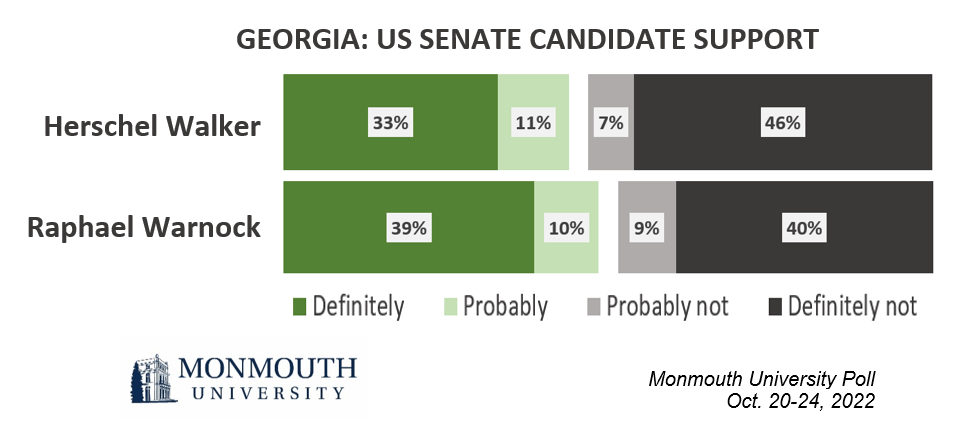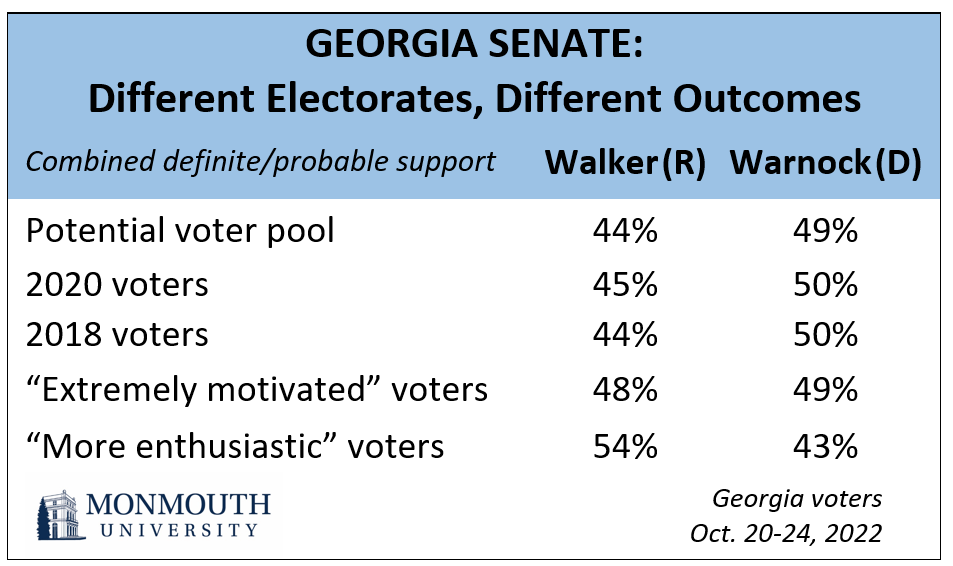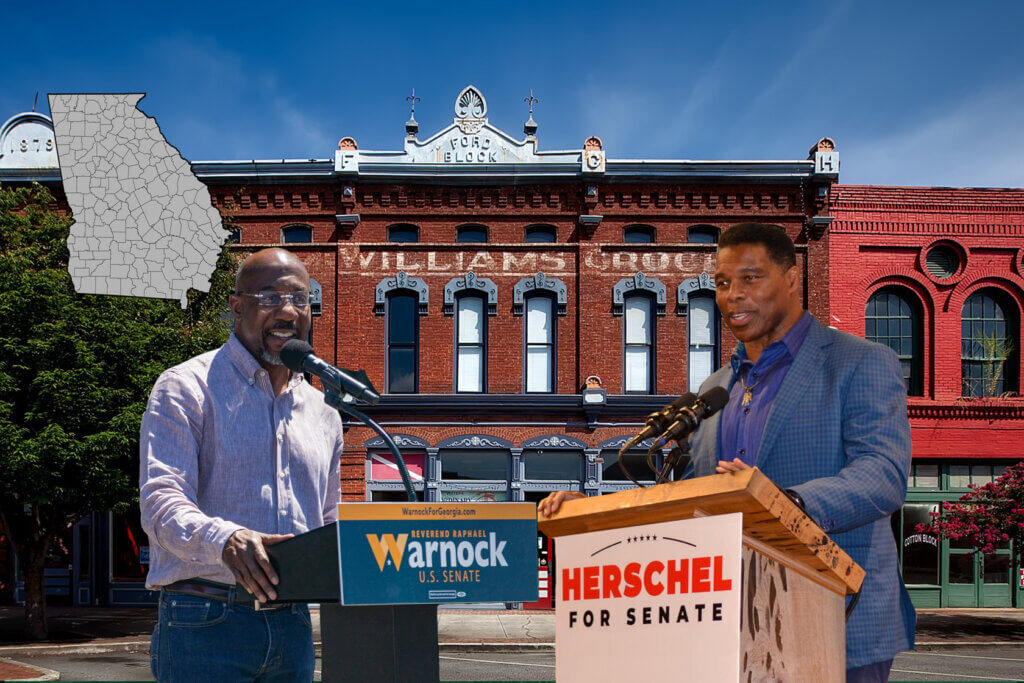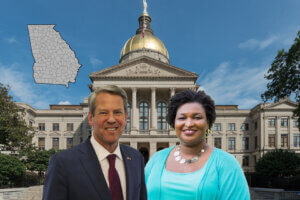West Long Branch, NJ – The U.S. Senate race in Georgia remains tight. Incumbent Sen. Raphael Warnock has a significant lead among early voters, while challenger Herschel Walker is bolstered by the potential for more support among highly motivated Election Day voters. The Monmouth (“Mon-muth”) University Poll finds the Democrat with better favorable ratings while the Republican is unable to take advantage of key issues that have been helping the GOP nationally.
Warnock holds a net positive rating of 51% favorable to 43% unfavorable among Georgia voters, while Walker has a net negative rating of 43% favorable to 52% unfavorable. Changes in these ratings since last month have been small and within the poll’s margin of error – i.e., the Democrat’s positive number has increased by 3 points while the Republican’s negative number has gone up by 4 points.
Just under half of Georgia voters say they will either definitely (39%) or probably (10%) vote for Warnock in November and a slightly smaller number will either definitely (33%) or probably (11%) vote for Walker. These numbers also include those who have already cast their ballots in early voting – representing about 1 in 4 potential voters in this election. At the other end of the spectrum, 40% say they will definitely not vote for Warnock and 46% say the same for Walker. The number of voters who give their definite support has increased by 7 points for each candidate since September, while the number who say they definitely would not vote for them has gone down a couple of points for Warnock (from 42% to 40%) and up a few points for Walker (from 43% to 46%).

“Walker’s path to victory is narrow, but it’s still there. He needs to get enough voters to overlook their misgivings about him to come over to his support or benefit from a turnout disparity among the two parties’ base voters. At this point, the latter option looks like his better bet,” said Patrick Murray, director of the independent Monmouth University Polling Institute.
The poll does not attempt to predict turnout, but past voter history metrics and self-reported enthusiasm give a picture of a range of possible outcomes. Among voters who participated in the 2020 presidential election, half definitely (40%) or probably (10%) support Warnock while a slightly smaller number definitely (34%) or probably (11%) support Walker. The race is also close among those who voted in the 2018 “blue wave” midterm election, with support for Warnock (41% definite and 9% probable) slightly stronger than support for Walker (34% definite and 10% probable). Among 6 in 10 voters who are extremely motivated to turn out this year, support levels are much more even between Warnock (43% definite and 6% probable) and Walker (39% definite and 9% probable). Drilling down even farther, the Republican has an advantage among the 4 in 10 Georgia voters who are more enthusiastic about this year’s election compared to prior races – 44% definite and 10% probable for Walker compared with 39% definite and 4% probable for Warnock.

One in four potential voters have already cast their ballots in this election. These voters back Warnock (61%) over Walker (34%) by a large margin. Among other voters who intend to vote during Georgia’s early voting period, more are aligned with Warnock (37% definite and 15% probable) than Walker (28% definite and 14% probable). The Republican, however, has a large advantage among those who plan to vote on Election Day – 39% definite and 15% probable for Walker compared with just 24% definite and 10% probable for Warnock.
“It’s pretty reasonable to come up with turnout scenarios where either candidate is slightly ahead. The unknown question is to what extent Republican enthusiasm on Election Day is able to overcome the Democratic advantage in early voting,” said Murray.
Turning to key issues in the race, the top concern for Georgia voters is financial. Four in ten (41%) choose “jobs, the economy and cost of living” from a list of seven policy areas as the most important issue in determining their vote for U.S. Senate. This is the most important factor for both Republicans (49%) and independents (43%), whereas Democrats split their top concerns between abortion (33%) and the economy (27%).
Warnock has been able to ride above the drag economic worries are having on Democrats nationally. Georgia voters are evenly divided between whether they trust him more (41%) or Walker more (40%) to handle this issue. The electorate is also fairly evenly divided on which candidate they trust on hot button issues such as crime, immigration, and gun control. Warnock has a clear edge over Walker on the issue of abortion (42% to 33%), including among independent voters.
“Warnock is running even with his opponent on issues that are hurting Democrats in other places. That’s a large part of why he’s still in the hunt with an electorate that tends to lean conservative,” said Murray.
Walker’s political views (50%) are slightly more likely than Warnock’s (45%) to be seen as in line with most state residents. However, this is largely due to the partisan makeup of the electorate, which has more self-identified Republicans than Democrats. Among independents, the two candidates are about even in being seen as in line politically with most Georgians (46% for Walker and 48% for Warnock).
President Joe Biden (42% favorable and 57% unfavorable) and former President Donald Trump (43% favorable and 56% unfavorable) receive similarly negative ratings from Georgia voters. Eight in 10 (82%) describe Warnock as a strong supporter of Biden while a similar number (77%) say Walker is a strong supporter of Trump.
The poll also finds that Libertarian candidate, Chase Oliver, is unknown to the vast majority of voters, with just 1% saying they will definitely support him in this election and another 9% lending their probable support. Among voters who have already cast their ballots, Oliver is backed by 4%. If he maintains that level of support in the final vote count, a runoff election would be likely given how close the two major party candidates’ vote shares are currently.
The Monmouth University Poll was conducted by telephone from October 20 to 24, 2022 with 615 Georgia registered voters. The question results in this release have a margin of error of +/- 5.0 percentage points for the full sample. The poll was conducted by the Monmouth University Polling Institute in West Long Branch, NJ.
QUESTIONS AND RESULTS
(* Some columns may not add to 100% due to rounding.)
1/2.I am going to read you a list of candidates running for U.S. Senate in Georgia this year. For each one, please tell me if you have definitely heard of them, not sure if you’ve heard of them, or if you’ve definitely not heard of them?
[If DEFINITELY HEARD OF:] For each of the following, please tell me if you have a very favorable, somewhat favorable, somewhat unfavorable, or very unfavorable opinion of them. [NAMES WERE ROTATED]
| TREND: | Very favorable | Somewhat favorable | Somewhat unfavorable | Very unfavorable | Heard of, no opinion (VOL) | Not sure if heard of | Definitely not heard of | (n) |
| Herschel Walker, the Republican | 25% | 18% | 11% | 41% | 3% | 1% | 1% | (615) |
| — Sept. 2022 | 22% | 20% | 13% | 35% | 6% | 1% | 4% | (601) |
| Raphael Warnock, the Democrat | 34% | 17% | 9% | 34% | 4% | 1% | 1% | (615) |
| — Sept. 2022 | 32% | 16% | 10% | 34% | 5% | 0% | 3% | (601) |
| Chase Oliver, the Libertarian | 0% | 10% | 6% | 3% | 7% | 9% | 64% | (615) |
| — Sept. 2022 | 1% | 4% | 2% | 1% | 2% | 10% | 78% | (601) |
[QUESTIONS 3 & 4 WERE ROTATED]
3.How likely are you to vote for Herschel Walker in the election for U.S. Senate – will you definitely vote for him, probably vote for him, probably not vote for him, or definitely not vote for him?
| TREND: | Oct. 2022 | Sept. 2022 |
| Definitely (or already voted for him) | 33% | 26% |
| Probably | 11% | 15% |
| Probably not | 7% | 10% |
| Definitely not (or already voted for someone else) | 46% | 43% |
| (VOL) Don’t know | 4% | 6% |
| (n) | (615) | (601) |
4.How likely are you to vote for Raphael Warnock in the election for U.S. Senate – will you definitely vote for him, probably vote for him, probably not vote for him, or definitely not vote for him?
| TREND: | Oct. 2022 | Sept. 2022 |
| Definitely (or already voted for him) | 39% | 32% |
| Probably | 10% | 13% |
| Probably not | 9% | 8% |
| Definitely not (or already voted for someone else) | 40% | 42% |
| (VOL) Don’t know | 3% | 5% |
| (n) | (615) | (601) |
5.How likely are you to vote for Chase Oliver in the election for U.S. Senate – will you definitely vote for him, probably vote for him, probably not vote for him, or definitely not vote for him?
| Oct. 2022 | |
| Definitely (or already voted for him) | 1% |
| Probably | 9% |
| Probably not | 26% |
| Definitely not (or already voted for someone else) | 54% |
| (VOL) Don’t know | 10% |
| (n) | (615) |
6.Who do you trust more on [READ ITEM] – Herschel Walker, Raphael Warnock, both equally, or neither one? [ITEMS WERE ROTATED] [NAMES WERE ROTATED]
| TREND: | Herschel Walker | Raphael Warnock | Both equally | Neither one | (VOL) Don’t know | (n) |
| Immigration | 40% | 38% | 3% | 16% | 3% | (615) |
| — Sept. 2022 | 36% | 37% | 4% | 18% | 4% | (601) |
| Gun control | 40% | 38% | 4% | 16% | 3% | (615) |
| — Sept. 2022 | 40% | 36% | 3% | 16% | 5% | (601) |
| Abortion | 33% | 42% | 2% | 17% | 5% | (615) |
| — Sept. 2022 | 30% | 39% | 2% | 22% | 7% | (601) |
| Jobs, the economy and cost of living | 40% | 41% | 4% | 14% | 1% | (615) |
| — Sept. 2022 | 37% | 39% | 4% | 17% | 2% | (601) |
| Defending your values | 38% | 42% | 5% | 14% | 1% | (615) |
| — Sept. 2022 | 36% | 43% | 3% | 17% | 2% | (601) |
| Crime | 39% | 41% | 4% | 15% | 1% | (615) |
| — Sept. 2022 | — | — | — | — | — | n/a |
| Elections and voting processes | 36% | 43% | 4% | 15% | 2% | (615) |
| — Sept. 2022 | — | — | — | — | — | n/a |
7.And which of the issues I just mentioned is most important to you in determining your vote for U.S. Senate?
| Oct. 2022 | |
| Immigration | 5% |
| Gun control | 11% |
| Abortion | 18% |
| Jobs, the economy and cost of living | 41% |
| Defending your values | 10% |
| Crime | 6% |
| Elections and voting processes | 7% |
| (VOL) Don’t know | 2% |
| (n) | (615) |
[QUESTIONS 8 & 9 WERE ROTATED]
8.Are Herschel Walker’s political views in line or out of step with most residents of Georgia?
| Oct. 2022 | |
| In line | 50% |
| Out of step | 38% |
| (VOL) Don’t know | 12% |
| (n) | (615) |
9.Are Raphael Warnock’s political views in line or out of step with most residents of Georgia?
| Oct. 2022 | |
| In line | 45% |
| Out of step | 44% |
| (VOL) Don’t know | 11% |
| (n) | (615) |
[QUESTIONS 10 & 11 WERE ROTATED]
10.Would you describe Herschel Walker as a strong supporter of Donald Trump, or not particularly a strong supporter?
| Oct. 2022 | |
| Strong supporter | 77% |
| Not strong | 11% |
| (VOL) Don’t know | 12% |
| (n) | (615) |
11.Would you describe Raphael Warnock as a strong supporter of Joe Biden, or not particularly a strong supporter?
| Oct. 2022 | |
| Strong supporter | 82% |
| Not strong | 12% |
| (VOL) Don’t know | 6% |
| (n) | (615) |
[Q12-22 held for future release.]
[QUESTIONS 23 & 24 WERE ROTATED]
23.Is your general impression of Donald Trump very favorable, somewhat favorable, somewhat unfavorable, or very unfavorable?
| TREND: | Oct. 2022 | Sept. 2022 |
| Very favorable | 22% | 22% |
| Somewhat favorable | 21% | 23% |
| Somewhat unfavorable | 11% | 11% |
| Very unfavorable | 45% | 43% |
| (VOL) Don’t know | 2% | 1% |
| (n) | (615) | (601) |
24.Is your general impression of Joe Biden very favorable, somewhat favorable, somewhat unfavorable, or very unfavorable?
| TREND: | Oct. 2022 | Sept. 2022 |
| Very favorable | 18% | 16% |
| Somewhat favorable | 24% | 25% |
| Somewhat unfavorable | 12% | 12% |
| Very unfavorable | 45% | 47% |
| (VOL) Don’t know | 1% | 2% |
| (n) | (615) | (601) |
25.How motivated are you to vote in this year’s election – extremely motivated, very motivated, somewhat motivated, or not motivated?
| TREND: | Oct. 2022 | Sept. 2022 |
| Extremely motivated | 62% | 61% |
| Very motivated | 23% | 20% |
| Somewhat motivated | 12% | 13% |
| Not motivated | 3% | 6% |
| (VOL) Don’t know | 0% | 0% |
| (n) | (615) | (601) |
26.Compared to past elections for U.S. Senate and Congress, are you more enthusiastic than usual, less enthusiastic, or about the same as past elections?
| TREND: | Oct. 2022 | Sept. 2022 |
| More enthusiastic | 41% | 34% |
| Less enthusiastic | 10% | 12% |
| About the same | 48% | 53% |
| (VOL) Don’t know | 1% | 2% |
| (n) | (615) | (601) |
[Q27 held for future release.]
28.Have you already voted in the upcoming general election, or not? [If ALREADY VOTED:] How did you vote this year – in person at an early voting location or by mail ballot?
[IF NOT VOTED YET:] How will you vote this year – in person on Election Day, in person at an early voting location, by mail ballot, or won’t you vote at all?
| Oct. 2022 | |
| Will vote In person on Election Day | 33% |
| Already voted in person | 22% |
| Will vote in person early | 35% |
| Already voted by mail | 3% |
| Will vote by mail | 5% |
| Won’t vote at all | 1% |
| (VOL) Don’t know | 2% |
| (n) | (615) |
METHODOLOGY
The Monmouth University Poll was sponsored and conducted by the Monmouth University Polling Institute from October 20 to 24, 2022 with a probability-based random sample of 615 Georgia voters drawn from a list of active registered voters who participated in at least one general election since 2016 or have newly registered since the 2020 election. This includes 151 contacted by a live interviewer on a landline telephone and 464 contacted by a live interviewer on a cell phone, in English. Monmouth is responsible for all aspects of the survey design, data weighting and analysis. The full sample is weighted for party registration, age, gender, race, education, and region based on state voter registration list information and U.S. Census information (CPS 2018 supplement). Data collection support provided by Braun Research (field) and Aristotle (voter sample). For results based on this sample, one can say with 95% confidence that the error attributable to sampling has a maximum margin of plus or minus 5.0 percentage points (adjusted for sample design effects). Sampling error can be larger for sub-groups (see table below). In addition to sampling error, one should bear in mind that question wording and practical difficulties in conducting surveys can introduce error or bias into the findings of opinion polls.
| DEMOGRAPHICS (weighted) |
| REGISTERED VOTERS |
| Party Inferred (primary history) |
| 47% Republican |
| 16% Other/none |
| 36% Democrat |
| Self-Reported Party |
| 36% Republican |
| 38% Independent |
| 27% Democrat |
| 46% Male |
| 54% Female |
| 24% 18-34 |
| 24% 35-49 |
| 27% 50-64 |
| 25% 65+ |
| 62% White, non-Hispanic |
| 30% Black |
| 4% Hispanic |
| 4% Asian/other |
| 66% No degree |
| 34% 4 year degree |
Click on pdf file link below for full methodology and crosstabs by key demographic groups.




